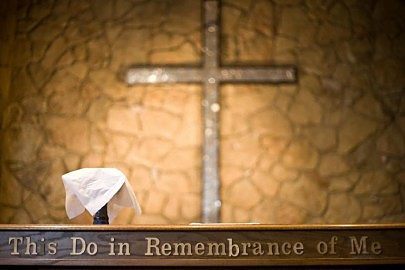January 18, 2014
Every year from Jan. 18-25 in churches around the world, there is a Week of Prayer for Christian Unity. It should not be taken for granted, for it was not always so.
The Church Unity Octave was first observed in January 1908 and celebrated in the chapel of a small Atonement Franciscan Convent of the Protestant Episcopal Church, on a remote hillside 50 miles north of New York City.
It was the initiative of two American Episcopalians, Father Paul James Wattson and Sister Lurana White, co-founders of the Franciscan Friars and Sisters of the Atonement. Both of them desired to see the reunion of the Anglican Communion with the Roman Catholic Church.
Towards that end, they started a prayer movement that explicitly prayed for the return of non-Catholic Christians to the Holy See. Not surprisingly, with the exception of a small number of Anglo-Catholics and Roman Catholics, there were few who got on board with that vision of things.
This idea of a period of prayer for Christian unity originated in a conversation of Father Wattson with an English clergyman, Reverend Spencer Jones. In 1907, Jones suggested that a day be set aside for prayer for Christian unity. Father Paul Wattson agreed with the concept but offered the idea of an octave of prayer between the Feast of St. Peter’s Chair on Jan. 18 and the Feast of the Conversion of St. Paul on Jan. 25.
Pope Pius X gave his blessing to the Church Unity Octave when Father Paul and Sister Lurana became Roman Catholics themselves, and in 1916, Pope Benedict XV extended its observance to the universal church. This recognition by papal authority gave the octave its impetus throughout the Roman Catholic Church.
In 1935 Abbé Paul Couturier, a priest of the Archdiocese of Lyons who also had a fire in his heart for unity, sought a way of bringing Protestants into this circle of prayer. He promoted prayer for Christian unity on the inclusive basis that “our Lord would grant to his Church on earth that peace and unity which were in his mind and purpose, when, on the eve of His Passion, He prayed that all might be one.”
Couturier’s broader prayer for the unity that God wills and by the means that God wills pointed the way to the 1964 Decree on Ecumenism of Vatican II, which encouraged Roman Catholics to join in prayer services for unity with members of other churches. “Such prayers in common are certainly a very effective means of petitioning for the grace of unity, and they are a genuine expression of the ties which even now bind Catholics to their separated brethren,” the decree stated.
Today the Week of Prayer for Christian Unity belongs to all Christians who are sincerely interested in the fulfillment of Christ’s prayer “that all may be one (John 17:21).” Each year Christians in a different country of the world are charged with selection of a scripture passage and theme for the Week of Prayer.
This year’s theme, “Has Christ been divided?” (1 Corinthians 1:13), was chosen by the churches of Canada. It is drawn from the provocative question posed by the apostle Paul to the Christians of Corinth. Paul’s first letter to the Corinthians addresses us within our diversity and invites us to recognize that as Church in our particular places we are not to be isolated or to act over against each other, but rather to recognize our interconnectedness with all who call on the name of the Lord.
That theme of finding unity in diversity is certainly familiar to Canadians. Canada is known as a land rich in natural splendor and as a land of diverse peoples, from the indigenous First Nations peoples to people from around the world who have settled there and call it home. It has two official languages and celebrates the cultural heritages of people originating from many countries. It has learned how the broad range of ethnic backgrounds and cultural heritages can contribute to a healthy diversity enriching the lives of all.
Similarly, Paul’s letter addresses us within our Christian diversity and invites us to recognize that God has blessed us all, that the Holy Spirit has been at work among us all, and no one tradition of the faith can decide how to use the gifts brought by Christians from around the world without hearing and including their voices and experience in seeking the ultimate goal of Christian unity.
Will this prayer for unity, so close to the heart of Christ, find expression in our personal prayer and that of our church communities both this week and throughout the year?
Father Thomas Ryan, CSP, is the director of the Paulist Office for Ecumenical and Interfaith Relations based in Washington, D.C.
